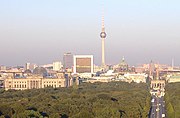This is an old revision of this page, as edited by Tommy2010 (talk | contribs) at 13:54, 6 September 2010 (→Government: weird sentence). The present address (URL) is a permanent link to this revision, which may differ significantly from the current revision.
Revision as of 13:54, 6 September 2010 by Tommy2010 (talk | contribs) (→Government: weird sentence)(diff) ← Previous revision | Latest revision (diff) | Newer revision → (diff) This article is about the country. For other uses of terms redirecting here, see Germany (disambiguation) and Deutschland (disambiguation).
| Federal Republic of Germany Error: {{Lang}}: text has italic markup (help) Template:De icon | |
|---|---|
 Flag
Flag
 Coat of arms
Coat of arms
| |
| Anthem: Third stanza of Error: {{Lang}}: text has italic markup (help) (also called Error: {{Lang}}: text has italic markup (help)) | |
 Location of Germany (dark green) Location of Germany (dark green)– in Europe (light green & dark grey) | |
| Capitaland largest city | Berlin |
| Official languages | German |
| Ethnic groups | 91.5% German, 8.5% other |
| Demonym(s) | German |
| Government | Federal parliamentary republic |
| • President | Christian Wulff (CDU) |
| • Chancellor | Angela Merkel (CDU) |
| • President of the Bundestag | Norbert Lammert (CDU) |
| Formation | |
| • Holy Roman Empire | 2 February 962 |
| • Unification | 18 January 1871 |
| • Federal Republic | 23 May 1949 |
| • Reunification | 3 October 1990 |
| Area | |
| • Total | 357,021 km (137,847 sq mi) (63rd) |
| • Water (%) | 2.416 |
| Population | |
| • Jan. 1, 2010 estimate | 81,757,600 (14th) |
| • Density | 229/km (593.1/sq mi) (55th) |
| GDP (PPP) | 2009 estimate |
| • Total | $2.806 trillion |
| • Per capita | $34,212 |
| GDP (nominal) | 2009 estimate |
| • Total | $3.352 trillion |
| • Per capita | $40,874 |
| Gini (2006) | 27 Error: Invalid Gini value |
| HDI (2007) | Error: Invalid HDI value (22nd) |
| Currency | Euro (€) (EUR) |
| Time zone | UTC+1 (CET) |
| • Summer (DST) | UTC+2 (CEST) |
| Drives on | Right |
| Calling code | 49 |
| ISO 3166 code | DE |
| Internet TLD | .de |
| |
Germany (/ˈdʒɜːrməni/), officially the Federal Republic of Germany (Template:Lang-de, Template:IPA-de), is a country in Central Europe. It is bordered to the north by the North Sea, Denmark, and the Baltic Sea; to the east by Poland and the Czech Republic; to the south by Austria and Switzerland; and to the west by France, Luxembourg, Belgium, and the Netherlands. The territory of Germany covers 357,021 square kilometers (137,847 sq mi) and is influenced by a temperate seasonal climate. With 81.8 million inhabitants in 2010, it has the largest population among member states of the European Union, and it is home to the third-largest number of international migrants worldwide.
A region named Germania, inhabited by several Germanic peoples, has been known and documented before AD 100. Beginning in the 10th century, German territories formed a central part of the Holy Roman Empire, which lasted until 1806. During the 16th century, northern Germany became the centre of the Protestant Reformation. As a modern nation-state, the country was first unified amidst the Franco-Prussian War in 1871. After World War II, Germany was divided in 1949 into two separate states—East Germany and West Germany—along the lines of Allied occupation. Germany was reunified in 1990 upon the entry of the German Democratic Republic into the Federal Republic. West Germany was a founding member of the European Community (EC) in 1957, which became the European Union in 1993. It is part of the Schengen Area and adopted the European currency, the euro, in 1999.
Germany is a federal parliamentary republic of sixteen states ( Error: {{Lang}}: text has italic markup (help)). The capital and largest city is Berlin. Germany is a member of the United Nations, NATO, G8, G20, and the OECD. It is a major power with the world's fourth largest economy by nominal GDP and the fifth largest in purchasing power parity. It is the second largest exporter and third largest importer of goods. In absolute terms, Germany allocates the second biggest annual budget of development aid in the world, while its military expenditure ranked seventh. The country has developed a high standard of living and established a comprehensive system of social security. It holds a key position in European affairs and maintains a multitude of close partnerships on a global level. Germany is recognised as a scientific and technological leader in several fields.
History
Main article: History of GermanyEtymology
Main articles: Names of Germany and List of country name etymologiesThe English word "Germany" derives from the Latin word Germania. The name "Germania" came into use after Julius Caesar adopted it from a Gallic term for the peoples east of the Rhine that probably meant "neighbour" or "men of forests" .
Germanic tribes 750BC-260
Main articles: Germanic peoples and Germania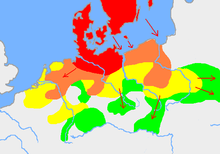
The ethnogenesis of the Germanic tribes is assumed to have occurred during the Nordic Bronze Age, or at the latest, during the Pre-Roman Iron Age. From southern Scandinavia and northern Germany, the tribes began expanding south, east and west in the 1st century BC, coming into contact with the Celtic tribes of Gaul as well as Iranian, Baltic, and Slavic tribes in Eastern Europe. Little is known about early Germanic history, except through their recorded interactions with the Roman Empire, etymological research and archaeological finds.
Under Augustus, the Roman General Publius Quinctilius Varus began to invade Germania (a term used by the Romans to define a territory running roughly from the Rhine to the Ural Mountains), and it was in this period that the Germanic tribes became familiar with Roman tactics of warfare while maintaining their tribal identity. In AD 9, three Roman legions led by Varus were defeated by the Cheruscan leader Arminius in the Battle of the Teutoburg Forest. Modern Germany, as far as the Rhine and the Danube, thus remained outside the Roman Empire. By AD 100, the time of Tacitus' Germania, Germanic tribes settled along the Rhine and the Danube (the Limes Germanicus) , occupying most of the area of modern Germany; Austria, southern Bavaria and the western Rhineland, however, were Roman provinces. The 3rd century saw the emergence of a number of large West Germanic tribes: Alamanni, Franks, Chatti, Saxons, Frisians, Sicambri, and Thuringii. Around 260, the Germanic peoples broke through the Limes and the Danube frontier into Roman-controlled lands.
Holy Roman Empire 962–1806
Main article: Holy Roman Empire See also: Medieval demography and Ostsiedlung
On 25 December 800, Charlemagne founded the Carolingian Empire, which was divided in 843. The medieval empire resulted from the eastern portion of this division and existed in varying forms from 962 until 1806. Its territory stretched from the Eider River in the north to the Mediterranean coast in the south. Often referred to as the Holy Roman Empire (or the Old Empire), it was officially called the Sacrum Romanum Imperium Nationis Germanicæ (Holy Roman Empire of the German Nation) starting in 1448, to adjust the title to its then reduced territory.
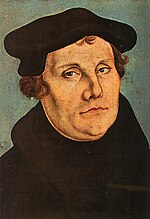
Under the reign of the Ottonian emperors (919–1024), the duchies of Lorraine, Saxony, Franconia, Swabia, Thuringia, and Bavaria were consolidated, and the German king was crowned Holy Roman Emperor of these regions in 962. Under the reign of the Salian emperors (1024–1125), the Holy Roman Empire absorbed northern Italy and Burgundy, although the emperors lost power through the Investiture Controversy. Under the Hohenstaufen emperors (1138–1254), the German princes increased their influence further south and east into territories inhabited by Slavs, preceding German settlement in these areas and further east (Ostsiedlung). Northern German towns grew prosperous as members of the Hanseatic League. Starting with the Great Famine in 1315, then the Black Death of 1348–50, the population of Germany plummeted.
The edict of the Golden Bull in 1356 provided the basic constitution of the empire that lasted until its dissolution. It codified the election of the emperor by seven prince-electors who ruled some of the most powerful principalities and archbishoprics. Beginning in the 15th century, the emperors were elected nearly exclusively from the Habsburg dynasty of Austria.
The monk Martin Luther publicised his 95 Theses in 1517, challenging practices of the Roman Catholic Church, initiating the Protestant Reformation. A separate Lutheran church became the official religion in many German states after 1530. Religious conflict led to the Thirty Years' War (1618–1648), which devastated German lands. The population of the German states was reduced by about 30%. The Peace of Westphalia (1648) ended religious warfare among the German states, but the empire was de facto divided into numerous independent principalities. From 1740 onwards, the dualism between the Austrian Habsburg Monarchy and the Kingdom of Prussia dominated German history. In 1806, the Imperium was overrun and dissolved as a result of the Napoleonic Wars.
Restoration and revolution 1814–1871
Main article: German Confederation
Following the fall of Napoleon Bonaparte, the Congress of Vienna convened in 1814 and founded the German Confederation (Deutscher Bund), a loose league of 39 sovereign states. Disagreement with restoration politics partly led to the rise of liberal movements, demanding unity and freedom. These, however, were followed by new measures of repression by the Austrian statesman Metternich. The Zollverein, a tariff union, profoundly furthered economic unity in the German states. During this era many Germans had been stirred by the ideals of the French Revolution, and nationalism became a more significant force, especially among young intellectuals. For the first time, the colours of black, red and gold were chosen to represent the movement, which later became the national colours.
In light of a series of revolutionary movements in Europe, which successfully established a republic in France, intellectuals and commoners started the Revolutions of 1848 in the German states. The monarchs initially yielded to the revolutionaries' liberal demands. King Frederick William IV of Prussia was offered the title of Emperor, but with a loss of power; he rejected the crown and the proposed constitution, leading to a temporary setback for the movement. Conflict between King William I of Prussia and the increasingly liberal parliament erupted over military reforms in 1862, and the king appointed Otto von Bismarck the new Prime Minister of Prussia. Bismarck successfully waged war on Denmark in 1864. Prussian victory in the Austro-Prussian War of 1866 enabled him to create the North German Federation (Norddeutscher Bund) and to exclude Austria, formerly the leading German state, from the affairs of the remaining German states.
German Empire 1871–1918
Main articles: German Empire and World War I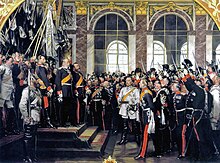
The state known as Germany was unified as a modern nation-state in 1871, when the German Empire was forged, with the Kingdom of Prussia as its largest constituent. After the French defeat in the Franco-Prussian War, the German Empire was proclaimed in Versailles on 18 January 1871. The Hohenzollern dynasty of Prussia ruled the new empire, whose capital was Berlin. The empire was a unification of all the scattered parts of Germany except Austria (]] Error: {{Lang}}: text has italic markup (help), or "Lesser Germany"). But internally the official political unification came rather sequentially: Germany had no national flag until 1892 and no national hymn until after WW I. Beginning in 1884, Germany began establishing several colonies outside of Europe.
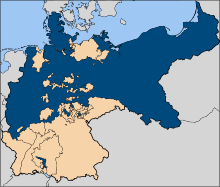
In the Error: {{Lang}}: text has italic markup (help) period following the unification of Germany, Emperor William I's foreign policy secured Germany's position as a great nation by forging alliances, isolating France by diplomatic means, and avoiding war. Under William II, however, Germany, like other European powers, took an imperialistic course leading to friction with neighbouring countries. Most alliances in which Germany had been previously involved were not renewed, and new alliances excluded the country. Specifically, France established new relationships by signing the Entente Cordiale with Great Britain and securing ties with the Russian Empire. Aside from its contacts with Austria-Hungary, Germany became increasingly isolated.
Germany's imperialism reached outside of its own country and joined many other powers in Europe in claiming their share of Africa. The Berlin Conference divided Africa between the European powers. Germany owned several pieces of land in Africa including German East Africa, South-West Africa, Togo, and Cameroon. The Scramble for Africa caused tension between the great powers that may have contributed to the conditions that led to World War I.
The assassination of Austria's crown prince on 28 June 1914 triggered World War I. Germany, as part of the unsuccessful Central Powers, suffered defeat against the Allied Powers in one of the bloodiest conflicts of all time. An estimated two million German soldiers died in World War I. The German Revolution broke out in November 1918, and Emperor William II and all German ruling princes abdicated. An armistice putting an end to the war was signed on 11 November and Germany was forced to sign the Treaty of Versailles in June 1919. Its negotiation, contrary to traditional post-war diplomacy, excluded the defeated Central Powers. The treaty was perceived in Germany as a humiliating continuation of the war. The treaty's harshness is often cited as an influence toward the later rise of Nazism in the country.
Weimar Republic 1919–1933
Main article: Weimar Republic
At the beginning of the German Revolution, Germany was declared a republic and the monarchy collapsed. However, the struggle for power continued, with radical-left communists seizing power in Bavaria, but failing to take control of all of Germany. The revolution came to an end in August 1919, when the Weimar Republic was formally established. The Weimar Constitution came into effect with its signing by President Friedrich Ebert on 11 August 1919.
Suffering from the Great Depression, the harsh peace conditions dictated by the Treaty of Versailles, and a long succession of more or less unstable governments, the people of Germany increasingly lacked identification with their political system and the "Establishment Parties" in their parliamentary democracy. This was exacerbated by a widespread right-wing (monarchist, völkisch, and Nazi) Error: {{Lang}}: text has italic markup (help), which promoted the view that Germany had lost World War I because of the efforts and influence of those who wanted to overthrow the government. The top brass of the Weimar government was accused of betraying the German Nation by signing the Versailles Treaty, while the radical left-wing communists, such as the Spartacist League, had wanted a revolution to abolish "capitalist rule" in favour of a Error: {{Lang}}: text has italic markup (help), and were also targeted.
Discontentment with the new Weimar government helped fuel the growth of the German Communist Party. Many conservatives were drawn towards the reactionary/revolutionary right, particularly the National Socialist German Workers Party—the Nazi Party. By 1932, these two parties controlled the majority of parliament (296 total parliamentary seats by July 1932). After a series of unsuccessful cabinets, President Paul von Hindenburg made a crucial decision: on 30 January 1933, seeing little alternative and pushed by right-wing advisors, von Hindenburg appointed Adolf Hitler as Chancellor of Germany, honoring Hitler's request.
Third Reich 1933–1945
Main article: Nazi Germany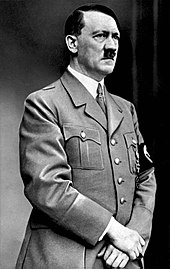
On 27 February 1933, the Reichstag building went up in flames, and a consequent emergency decree abrogated basic citizen rights. An Enabling Act passed in parliament gave Hitler unrestricted legislative power. Only the Social Democratic Party voted against it, while Communist MPs had already been imprisoned. Using his powers to crush any actual or potential resistance, Hitler established a centralised totalitarian state within months. Industry was revitalised with a focus on military rearmament. In 1935, Germany reacquired control of the Saar and in 1936 military control of the Rhineland, both of which had been lost by the Treaty of Versailles.
Leading to World War II and roughly in parallel with military rearmament, German foreign policy became more aggressive and expansionistic. In 1938 and 1939, Austria and Czechoslovakia were brought under control and the invasion of Poland prepared (Hitler-Stalin pact, Operation Himmler). On 1 September 1939, the German Wehrmacht launched a blitzkrieg on Poland, which was swiftly occupied by Germany and by the Soviet Red Army. The UK and France declared war on Germany marking the beginning of World War II in Europe. As the war progressed, Germany and its allies quickly gained control of much of continental Europe.

On 22 June 1941, Germany broke the Hitler-Stalin pact and invaded the Soviet Union. The same year, Japan attacked the American base at Pearl Harbor, and Germany declared war on the United States as a consequence of its alliance with Japan. Although the German army advanced into the Soviet Union quite rapidly, the Battle of Stalingrad marked a major turning point in the war. Subsequently, the German army started to retreat on the Eastern front. In September 1943, Germany's ally Italy surrendered, and German forces were forced to defend an additional front in Italy. D-Day marked another major turning point in the war, opening up a Western front; the Allied forces landed on the beaches of Normandy and made advances towards German territory. Germany's defeat soon followed. On 8 May 1945, the German armed forces surrendered after the Red Army occupied Berlin. Approximately seven million German soldiers and civilians—including ethnic Germans from Eastern Europe—died during World War II.
In what later became known as The Holocaust, the Third Reich regime enacted governmental policies directly subjugating many dissidents and minorities. About seventeen million people were murdered by the Nazis during the Holocaust, including six million Jews and a sizable number of Gypsies, Jehovah's Witnesses, Poles and other Slavs, including Soviet POWs, the mentally ill, homosexuals, and members of the political opposition. World War II and the Nazi genocide were responsible for more than 40 million dead in Europe. The Nuremberg trials of Nazi war criminals were held after World War II.
Division and reunification 1945–1990
Main article: History of Germany (1945–1990)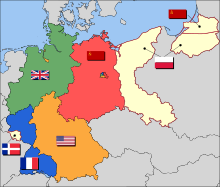
The war resulted in the death of over five million German soldiers and civilians; large territorial losses; the expulsion of about 15 million Germans from the eastern areas of Germany and other countries; mass rape of German women; and the destruction of multiple major cities. The remaining national territory and Berlin were partitioned by the Allies into four military occupation zones.
The western sectors, controlled by France, the United Kingdom, and the United States, were merged on 23 May 1949, to form the Federal Republic of Germany (Bundesrepublik Deutschland); on 7 October 1949, the Soviet Zone became the German Democratic Republic (Deutsche Demokratische Republik, or DDR). They were, mainly outside Germany, informally known as "West Germany" and "East Germany", and the two parts of Berlin as "West Berlin" and "East Berlin". East Germany selected East Berlin as its capital, while West Germany chose Bonn. However, West Germany declared the status of its capital Bonn as provisional, in order to emphasise its stance that the two-state solution was an artificial status quo that was to be overcome one day.
West Germany, established as a federal parliamentary republic with a "social market economy", was allied with the United States, the UK and France. The country came to enjoy prolonged economic growth beginning in the early 1950s ( Error: {{Lang}}: text has italic markup (help)). West Germany joined NATO in 1955 and was a founding member of the European Economic Community in 1957. On 1 January 1957, Saarland gave in its adhesion to West Germany by virtue of article 23 Error: {{Lang}}: text has italic markup (help).

East Germany was an Eastern bloc state under political and military control by the USSR via the latter's occupation forces and the Warsaw Pact. While claiming to be a democracy, political power was solely executed by leading members (Politburo) of the communist-controlled SED (Socialist Unity Party of Germany). Their power was ensured by the Stasi, a secret service of immense size, and a variety of SED suborganizations controlling every aspect of society. In return, the basic needs of the population were satisfied at low cost by the state. A Soviet-style command economy was set up; later, the GDR became a Comecon state. While East German propaganda was based on the benefits of the GDR's social programs and the alleged constant threat of a West German invasion, many of her citizens looked to the West for political freedoms and economic prosperity. The Berlin Wall, built in 1961 to stop East Germans from escaping to West Germany, became a symbol of the Cold War.
Tensions between East and West Germany were somewhat reduced in the early 1970s by Chancellor Willy Brandt's Error: {{Lang}}: text has italic markup (help), which included the de facto acceptance of Germany's territorial losses in World War II.
In the summer of 1989, Hungary decided (May 2) to dismantle the Iron Curtain and open the borders (August 23), causing an exodus of thousands of East Germans (September 11) going to West Germany via Hungary. The Hungarian events had devastating effects on the GDR, with mass demonstrations. The East German authorities unexpectedly eased the border restrictions in November, allowing East German citizens to travel to the West. Originally intended as a pressure valve to retain East Germany as a state, the opening of the border actually led to an acceleration of the Wende reform process in East Germany, which finally concluded with the Two Plus Four Treaty a year later on 12 September 1990, under which the four occupying powers renounced their rights under the Instrument of Surrender, and Germany regained full sovereignty. This permitted German reunification on 3 October 1990, with the accession of the five re-established states in the former GDR (New states or "neue Länder").
Berlin Republic and EU integration 1990–
Main article: History of Germany since 1990
Based on the Bonn-Berlin Act, adopted by the parliament on 10 March 1994, Berlin once again became the capital of the reunified Germany, while Bonn obtained the unique status of a Bundesstadt (federal city) retaining some federal ministries. The relocation of the government was completed in 1999.
Since reunification, Germany has taken a more active role in the European Union and NATO. Germany sent a peacekeeping force to secure stability in the Balkans and sent a force of German troops to Afghanistan as part of a NATO effort to provide security in that country after the ousting of the Taliban. These deployments were controversial, since after the war, Germany was bound by domestic law only to deploy troops for defence roles. Deployments to foreign territories were understood not to be covered by the defence provision; however, the parliamentary vote on the issue effectively legalised the participation in a peacekeeping context.
In 2005 Angela Merkel was elected the first female Chancellor of Germany. From 2005 to 2009 she led a grand coalition with the Christian Social Union (CSU), its Bavarian sister party, and the Social Democratic Party of Germany (SPD). Following general elections on September 27, 2009, Merkel built the current coalition government replacing the Social Democrats with Free Democratic Party (FDP).
Geography
Main article: Geography of Germany
Germany is located in the Central Europe, the territory covers 357,021 km (137,847 sq mi), consisting of 349,223 km (134,836 sq mi) of land and 7,798 km (3,011 sq mi) of water. It is the seventh largest country by area in Europe and the 63rd largest in the world.
Elevation ranges from the mountains of the Alps (highest point: the Zugspitze at 2,962 metres (9,718 ft)) in the south to the shores of the North Sea (Nordsee) in the north-west and the Baltic Sea (Ostsee) in the north-east. Between lie the forested uplands of central Germany and the low-lying lands of northern Germany (lowest point: Wilstermarsch at 3.54 metres (11.6 ft) below sea level), traversed by some of Europe's major rivers such as the Rhine, Danube and Elbe.
Germany shares borders with more European countries than any other country on the continent. Its neighbours are Denmark in the north, Poland and the Czech Republic in the east, Austria and Switzerland in the south, France and Luxembourg in the south-west and Belgium and the Netherlands in the north-west.
The most significant natural resources are iron ore, coal, potash, timber, lignite, uranium, copper, natural gas, salt, nickel, arable land and water.
State division
Main articles: States of Germany and List of administrative divisions of GermanyGermany comprises 16 states (Bundesländer), which are further subdivided into 439 districts (Kreise) and cities (kreisfreie Städte).
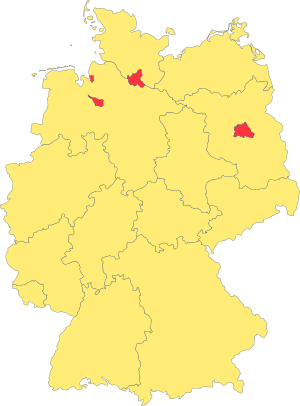
Vorpommern
Anhalt
Westphalia
Württemberg
|
Climate
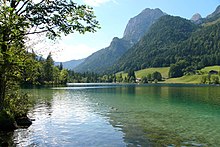
Most of Germany has a temperate seasonal climate in which humid westerly winds predominate. The climate is moderated by the North Atlantic Drift, which is the northern extension of the Gulf Stream. This warmer water affects the areas bordering the North Sea including the area along the Rhine, which flows into the North Sea. Consequently in the north-west and the north, the climate is oceanic; rainfall occurs year round with a maximum during summer.
Winters are mild and summers tend to be cool, though temperatures can exceed 30 °C (86 °F) for prolonged periods. In the east, the climate is more continental; winters can be very cold, summers can be very warm, and long dry periods are often recorded. Central and southern Germany are transition regions which vary from moderately oceanic to continental.
In addition to the maritime and continental climates that predominate over most of the country, the Alpine regions in the extreme south and, to a lesser degree, some areas of the Central German Uplands have a so-called mountain climate. This climate is characterized by lower temperatures because of higher altitudes and greater precipitation caused by air becoming moisture-laden as it lifts over higher terrain.
Biodiversity

Phytogeographically, Germany is shared between the Atlantic European and Central European provinces of the Circumboreal Region within the Boreal Kingdom. The territory of Germany can be subdivided into two ecoregions: European-Mediterranean montane mixed forests and Northeast-Atlantic shelf marine. The majority of Germany is covered by either arable land (33%) or forestry and woodland (31%). Only 15% is covered by permanent pastures.

Plants and animals are those generally common to middle Europe. Beeches, oaks, and other deciduous trees constitute one-third of the forests; conifers are increasing as a result of reforestation. Spruce and fir trees predominate in the upper mountains, while pine and larch are found in sandy soil. There are many species of ferns, flowers, fungi, and mosses. Fish abound in the rivers and the North Sea. Wild animals include deer, wild boar, mouflon, fox, badger, hare, and small numbers of beaver. Various migratory birds cross Germany in the spring and autumn.
The national parks in Germany include the Wadden Sea National Parks, the Jasmund National Park, the Vorpommern Lagoon Area National Park, the Müritz National Park, the Lower Oder Valley National Park, the Harz National Park, the Saxon Switzerland National Park and the Bavarian Forest National Park.
Germany is known for its many zoological gardens, wildlife parks, aquaria, and bird parks. More than 400 registered zoos and animal parks operate in Germany, which is believed to be the largest number in any single country of the world. The Zoologischer Garten Berlin is the oldest zoo in Germany and presents the most comprehensive collection of species in the world.
Environment

Germany is known for its environmental consciousness. Most Germans consider anthropogenic causes to be a significant factor in global warming. The state is committed to the Kyoto protocol and several other treaties promoting biodiversity, low emission standards, recycling, and the use of renewable energy, and supports sustainable development at a global level.
The German government has initiated wide-ranging emission reduction activities and the country´s overall emissions are falling. For example, since 1964, air pollution in Germany has been regulated by strict "TA Luft" legislation. Nevertheless Germany's carbon dioxide emissions per capita are among the highest in the EU, although they are significantly lower than those of Australia, Canada, Saudi Arabia and the United States.
Emissions from coal-burning utilities and industries contribute to air pollution. Acid rain, resulting from sulphur dioxide emissions, continues to damage German forests. Pollution in the Baltic Sea from raw sewage and industrial effluents from rivers in former East Germany have been reduced. The government under Chancellor Schröder announced the intention to end the use of nuclear power for producing electricity. Germany is working to meet EU commitments to identify nature preservation areas in line with the EU's Flora, Fauna, and Habitat directive. Germany's last glaciers in the Alpine region are experiencing deglaciation. Natural hazards are river flooding in spring and stormy winds occurring in all regions.
Government
Main article: Politics of Germany
Germany is a federal, parliamentary, representative democratic republic. The German political system operates under a framework laid out in the 1949 constitutional document known as the Grundgesetz (Basic Law). By calling the document Grundgesetz, rather than Verfassung (constitution), the authors expressed the intention that it would be replaced by a proper constitution once Germany was reunited as one state. Amendments to the Grundgesetz generally require a two-thirds majority of both chambers of the parliament; the fundamental principles of the constitution, as expressed in the articles guaranteeing human dignity, the separation of powers, the federal structure, and the rule of law are valid in perpetuity. Despite the initial intention, the Grundgesetz remained in effect after the German reunification in 1990, with only minor amendments.

The Chancellor—currently Angela Merkel—is the head of government and exercises executive power, similar to the role of a Prime Minister in other parliamentary democracies. Federal legislative power is vested in the parliament consisting of the Bundestag (Federal Diet) and Bundesrat (Federal Council), which together form a unique type of legislative body. The Bundestag is elected through direct elections, by proportional representation (mixed-member). The members of the Bundesrat represent the governments of the sixteen federal states and are members of the state cabinets. The respective state governments have the right to appoint and remove their envoys at any time.
The President, Christian Wulff, is the head of state and invested primarily with representative responsibilities and powers. He is elected by the Bundesversammlung (federal convention), an institution consisting of the members of the Bundestag and an equal number of state delegates. The second highest official in the German order of precedence is the Bundestagspräsident (President of the Bundestag), who is elected by the Bundestag and responsible for overseeing the daily sessions of the body. The third-highest official and the head of government is the Chancellor, who is appointed by the Bundespräsident after being elected by the Bundestag. The Chancellor can be removed by a constructive motion of no confidence by the Bundestag, where constructive implies that the Bundestag simultaneously has to elect a successor.
Since 1949, the party system has been dominated by the Christian Democratic Union and the Social Democratic Party of Germany with all chancellors hitherto being member of either party. However, the smaller liberal Free Democratic Party (which has had members in the Bundestag since 1949) and the Alliance '90/The Greens (which has controlled seats in parliament since 1983) have also played important roles, as they are regularly the smaller partner of a coalition government.
Law
Main articles: Judiciary of Germany and Law enforcement in Germany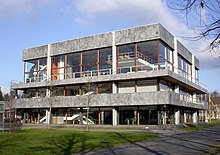
The Judiciary of Germany is independent of the executive and the legislative branches. Germany has a civil or statute law system that is based on Roman law with some references to Germanic law. The Bundesverfassungsgericht (Federal Constitutional Court), located in Karlsruhe, is the German Supreme Court responsible for constitutional matters, with power of judicial review. It acts as the highest legal authority and ensures that legislative and judicial practice conforms to the Basic Law for the Federal Republic of Germany (Basic Law). It acts independently of the other state bodies, but cannot act on its own behalf.
Germany's supreme court system, called Oberste Gerichtshöfe des Bundes, is specialised. For civil and criminal cases, the highest court of appeal is the Federal Court of Justice, located in Karlsruhe and Leipzig. The courtroom style is inquisitorial. Other Federal Courts are the Federal Labour Court in Erfurt, the Federal Social Court in Kassel, the Federal Finance Court in Munich and the Federal Administrative Court in Leipzig.
Criminal law and private law are codified on the national level in the Strafgesetzbuch and the Bürgerliches Gesetzbuch respectively. The German penal system is aimed towards rehabilitation of the criminal; its secondary goal is the protection of the general public. To achieve the latter, a convicted criminal can be put in preventive detention (Sicherungsverwahrung) in addition to the regular sentence if he is considered to be a threat to the general public. The Völkerstrafgesetzbuch regulates the consequences of crimes against humanity, genocide and war crimes. It gives German courts universal jurisdiction if prosecution by a court of the country where the crime was committed, or by an international court, is not possible.
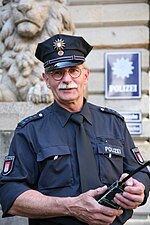
Legislative power is divided between the federation and the state level. The Basic Law presumes that all legislative power remains at the state level unless otherwise designated by the Basic Law itself.
Any federal law overrides state law if the legislative power lies at the federal level. A famous example is the purported Hessian provision for the death penalty, which goes against the ban on capital punishment under the Basic Law, rendering the Hessian provision invalid. The Bundesrat is the federal organ through which the states participate in national legislation. State participation in federal legislation is necessary if the law falls within the area of concurrent legislative power, requires states to administer federal regulations, or is so designated by the Basic Law. Every state has its own constitutional court. The Amtsgerichte, Landgerichte and Oberlandesgerichte are state courts of general jurisdiction. They are competent whether the action is based on federal or state law.
Many of the fundamental matters of administrative law remain in the jurisdiction of the states, though most states base their own laws in that area on the 1976 Verwaltungsverfahrensgesetz (Administrative Proceedings Act) covering important points of administrative law. The Oberverwaltungsgerichte are the highest level of administrative jurisdiction concerning the state administrations, unless the question of law concerns federal law or state law identical to federal law. In such cases, final appeal to the Federal Administrative Court is possible.
Foreign relations
Main article: Foreign relations of Germany
Germany has played a leading role in the European Union since its inception and has maintained a strong alliance with France since the end of World War II. The alliance was especially close in the late 1980s and early 1990s under the leadership of Christian Democrat Helmut Kohl and Socialist François Mitterrand. Germany is at the forefront of European states seeking to advance the creation of a more unified European political, defence and security apparatus. For a number of decades after WWII, the Federal Republic of Germany kept a notably low profile in international relations, because of both its recent history and its occupation by foreign powers.
During the Cold War, Germany's partition by the Iron Curtain made it a symbol of East-West tensions and a political battleground in Europe. However, Willy Brandt's Ostpolitik was a key factor in the détente of the 1970s. In 1999, Chancellor Gerhard Schröder's government defined a new basis for German foreign policy by taking a full part in the decisions surrounding the NATO war against Yugoslavia and by sending German troops into combat for the first time since World War II.
The governments of Germany and the United States are close political allies. The 1948 Marshall Plan and strong cultural ties have crafted a strong bond between the two countries, although Schröder's very vocal opposition to the Iraq War suggested the end of Atlanticism and a relative cooling of German-American relations. The two countries are also economically interdependent: 8.8% of German exports are U.S.-bound and 6.6% of German imports originate from the U.S. The other way around, 8.8% of U.S. exports ship to Germany and 9.8% of U.S. imports come from Germany. Other signs of the close ties include the continuing position of German-Americans as the largest ethnic group in the U.S. and the status of Ramstein Air Base (near Kaiserslautern) as the largest U.S. military community outside the U.S.
The development policy of the Federal Republic of Germany is an independent area of German foreign policy. It is formulated by the Federal Ministry for Economic Cooperation and Development (BMZ) and carried out by the implementing organisations. The German government sees development policy as a joint responsibility of the international community. It is the world's third biggest aid donor after the United States and France. Germany spent 0.37 per cent of its gross domestic product (GDP) on development, which is below the government's target of increasing aid to 0.51 per cent of GDP by 2010. The international target of 0.7% of GNP would have not been reached either.
Military
Main article: Bundeswehr
Germany's military, the Bundeswehr, is a military force with Heer (Army), Marine (Navy), Luftwaffe (Air Force), Zentraler Sanitätsdienst (Central Medical Services) and Streitkräftebasis (Joint Support Service) branches. Military service is compulsory for men at the age of 18, and conscripts serve six-month tours of duty. Conscientious objectors may instead opt for an equal length of Zivildienst (roughly translated as civilian service), or a six year commitment to (voluntary) emergency services like a fire department, the Red Cross or the THW. In 2003, military spending constituted 1.5% of the country's GDP. In peacetime, the Bundeswehr is commanded by the Minister of Defence, currently Karl-Theodor zu Guttenberg. If Germany went to war, which according to the constitution is allowed only for defensive purposes, the Chancellor would become commander in chief of the Bundeswehr.
The Bundeswehr employs 200,500 professional soldiers, 55,000 18–25 year-old conscripts who serve for at least six months under current rules, and 2,500 active reservists at any given time. Roughly 300,000 reservists are available to the Armed Forces and participate in defense exercises as well as deployments abroad.
Since 2001 women can serve in all functions of service without restriction, but they are not subject to conscription. There are presently around 14,500 women on active duty and a number of female reservists who take part in all duties including peacekeeping missions and other operations. Two female medical officers have been promoted to a General rank so far.
As of November 2009, the German military had about 8,300 troops stationed in foreign countries as part of various international peacekeeping forces, including 2,470 Bundeswehr soldiers in Kosovo, 4,520 German troops in the NATO-led ISAF force in Afghanistan and Uzbekistan, and 450 troops with UNIFIL in Lebanon.
Demographics
Main articles: Germans, Demographics of Germany, and Social issues in Germany
With 82 million inhabitants in January 2010, Germany is the most populous country in the European Union. However, its fertility rate of 1.38 children per mother is one of the lowest in the world, and the federal statistics office estimates the population will shrink to between 65 and 70 million by 2060 (65 million assuming a net migration of +100,000 per year; 70 million assuming a net migration of +200,000 per year). With death rates continuously exceeding low-level birth rates, Germany is one of a few countries for which the demographic transition model would require a fifth stage in order to capture its demographic development.
Germans make up 91% of the population of Germany. As of December 2004, about seven million foreign citizens were registered in Germany, and 19% of the country's residents were of foreign or partially foreign descent (including persons descending or partially descending from ethnic German repatriates), 96 percent of whom lived in Western Germany or Berlin. It is estimated by the Federal Statistical Office of Germany that nearly 30% of Germans aged 5 years and younger have at least one parent who was born abroad.
In 2009, 20% of the population had immigrant roots, the highest since records were kept since 1945. As of 2008, the largest national group of people with a migrant background was from Turkey (2.5 million), followed by Italy (776,000) and Poland (687,000).
The United Nations Population Fund lists Germany as host to the third-highest number of international migrants worldwide, about 5% or 10 million of all 191 million migrants As a consequence of restrictions to Germany's formerly rather unrestricted laws on asylum and immigration, the number of immigrants seeking asylum or claiming German ethnicity (mostly from the former Soviet Union) has been declining steadily since 2000.
Large numbers of people with full or significant German ancestry are found in the United States (50 million), Brazil (5 million) and Canada (3 million). About 3 million "Aussiedler"—ethnic Germans, mainly from Eastern Europe and the former Soviet Union—have resettled in Germany since 1987.
Urbanization
Germany has a number of large cities; the most populous are: Berlin, Hamburg, Munich, Cologne, Frankfurt, and Stuttgart. The largest conurbation is the Rhine-Ruhr region (12 million), including Düsseldorf (the capital of North Rhine-Westphalia), Cologne, Essen, Dortmund, Duisburg, and Bochum.
| Rank | Core City / State | Population | ||
|---|---|---|---|---|
| 1 | Berlin / BE | 3,439,100 | ||
| 2 | Hamburg / HH | 1,769,117 | ||
| 3 | Munich / BY | 1,330,440 | ||
| 4 | Cologne / NW | 998,105 | ||
| 5 | Frankfurt am Main / HE | 671,927 | ||
| 6 | Stuttgart / BW | 600,068 | ||
| 7 | Düsseldorf / NW | 586,217 | ||
| 8 | Dortmund / NW | 581,308 | ||
| 9 | Essen / NW | 576,259 | ||
| 10 | Bremen / HB | 547.685 | ||
| 11 | Hanover / NI | 520,966 | ||
| 12 | Leipzig / SN | 518,862 | ||
| 13 | Dresden / SN | 517,052 | ||
| 14 | Nuremberg / BY | 503,673 | ||
| 15 | Duisburg / NW | 491,931 | ||
| Destatis (2009) |
Languages
Main article: Languages of Germany
German is the official and predominant spoken language in Germany. It is one of 23 official languages in the European Union, and one of the three working languages of the European Commission, along with English and French. Recognised native minority languages in Germany are Danish, Sorbian, Romany, and Frisian. They are officially protected by the ECRML. The most used immigrant languages are Turkish, Kurdish, Polish, the Balkan languages, and Russian.
Standard German is a West Germanic language and is closely related to and classified alongside English, Dutch, and the Frisian languages. To a lesser extent, it is also related to the East (extinct) and North Germanic languages. Most German vocabulary is derived from the Germanic branch of the Indo-European language family. Significant minorities of words are derived from Latin and Greek, with a smaller amount from French and most recently English (known as Denglisch). German is written using the Latin alphabet. In addition to the 26 standard letters, German has three vowels with Umlauts, namely ä, ö, and ü, as well as the Eszett or scharfes S (sharp s) which is written "ß".
German dialects are distinguished from varieties of standard German. German dialects are traditional local varieties and are traced back to the different German tribes. Many of them are not easily understandable to a speaker of standard German, since they often differ in lexicon, phonology, and syntax.
Around the world, German has approximately 100 million native speakers and also about 80 million non-native speakers. German is the main language of about 90 million people (18%) in the EU. 67% of German citizens claim to be able to communicate in at least one foreign language, 27% in at least two languages other than their own.
Religion
Main article: Religion in Germany
According to organizational reportings, Christianity is the largest religion in Germany, with 52.116 million adherents (63%) in 2007. 26.5 million are Protestants (32.3%) and 25.5 million are Catholics (31.0%) in 2007. The second largest religion is Islam with 4.3 million adherents (5%) followed by Buddhism and Judaism, both with around 200,000 adherents (c. 0.25%). Hinduism has some 90,000 adherents (0.1%) and Sikhism 75,000 (0.09%). All other religious communities in Germany have fewer than 50,000 (or less than 0.05%) adherents. About 24.4 million Germans (29.6%) have no registered religious denomination. According to a poll by Der Spiegel magazine, only 45% believe in God, and just a quarter in Jesus Christ.

Protestantism is concentrated in the north and east and Roman Catholicism is concentrated in the south and west. The current Pope, Benedict XVI, was born in Bavaria. Non-religious people, including atheists and agnostics might make as many as 55%, and are especially numerous in the former East Germany and major metropolitan areas.
Of the 4.3 million Muslims, most are Sunnis and Alevites from Turkey, but there are a small number of Shi'ites. 1.7% of the country's overall population declare themselves Orthodox Christians, Serbs and Greeks being the most numerous. Germany has Europe's third-largest Jewish population (after France and the United Kingdom). In 2004, twice as many Jews from former Soviet republics settled in Germany as in Israel, bringing the total Jewish population to more than 200,000, compared to 30,000 prior to German reunification. Large cities with significant Jewish populations include Berlin, Frankfurt and Munich. Around 250,000 active Buddhists live in Germany; 50% of them are Asian immigrants.
According to the Eurobarometer Poll 2005, 47% of German citizens agreed with the statement "I believe there is a God", whereas 25% agreed with "I believe there is some sort of spirit or life force" and 25% said "I do not believe there is any sort of spirit, god, or life force".
Education
Main article: Education in GermanyResponsibility for educational oversight in Germany lies primarily with the federal states individually, whilst the federal government only has a minor role. Optional kindergarten education is provided for all children between three and six years old, after which school attendance is compulsory for at least nine years. Primary education usually lasts for four years and public schools are not stratified at this stage. In contrast, secondary education includes three traditional types of schools based on a pupil's ability as determined by teacher recommendations: the Gymnasium enrolls the most gifted children and prepares students for university studies, and attendance lasts eight or nine years depending on the state; the Realschule has a broader range of emphasis for intermediate students and lasts six years; the Hauptschule prepares pupils for vocational education.
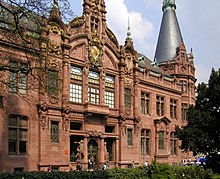
Since the 1960s, a reform movement attempted to unify secondary education in a Gesamtschule (comprehensive school). However, instead of overcoming the stratification, Gesamtschule just became a fourth type of secondary school. Since about 2000, several West German Länder simplified their school system to two or three tiers. Motives were: The example of Eastern Germany where in the 1990s, following reunification, a two-tier school system was established; mediocre scores in the Programme for International Student Assessment (PISA), first published in 2001, prompted a nation-wide debate about the school system, and in particular about the social selectivity of early stratification; having low standards of achievement, inner-city Hauptschulen were increasingly considered dysfunctional by some people; outside the metropoles, the population is shrinking, so that according to some people it becomes increasingly unpractical to maintain a three- or four-tier school system.
A special system of apprenticeship called Duale Ausbildung ("dual education") allows pupils in vocational training to learn in a company as well as in a state-run vocational school.
To enter a university in Germany, high school students are generally required to take the Abitur examination, which is similar to A-levels in the UK and typically done at the age of 18 or 19. However, students possessing a diploma from a vocational school may also apply for matriculation in certain subjects. Germany's universities are recognised internationally, indicating the high education standards in the country. In the ARWU ranking for 2008, six of the top 100 universities in the world are in Germany, and 18 in the top 200. Nearly all German universities are public (i.e. non-private) institutions, charging tuition fees ranging from €50–500 per semester for each student.
Economy
Main article: Economy of Germany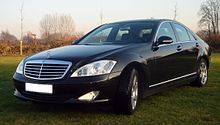
Germany has a social market economy characterised by a highly qualified labour force, a developed infrastructure, a large capital stock, a low level of corruption, and a high level of innovation. It has the largest national economy in Europe, the fourth largest by nominal GDP in the world, and ranked fifth by GDP (PPP) in 2008. The service sector contributes around 70% of the total GDP, industry 29.1%, and agriculture 0.9%. In July 2010 the average national unemployment rate was 7,5%, ranging from 4,1% in Bavaria to 13,6% in Berlin.

Since the age of industrialisation, the country has been a driver, innovator, and beneficiary of an ever more globalised economy. Germany is a founding member of the EU, the G8 and the G20 and was the world's largest exporter from 2003 to 2008. In 2009 it remains the second largest exporter and third largest importer of goods while generating a trade surplus of $189,7 billion.
Most of the country's export products are in engineering, especially in machinery, automobiles, chemical goods and metals,. Germany is the leading producer of wind turbines and solar power technology in the world. The largest annual international trade fairs and congresses are held in several German cities such as Hanover, Frankfurt, and Berlin.
Germany is an advocate of closer European economic and political integration. Its commercial policies are increasingly determined by agreements among European Union (EU) members and EU single market legislation. Germany introduced the common European currency, the euro on 1 January 2002. Its monetary policy is set by the European Central Bank in Frankfurt.
Two decades after German reunification, standards of living and per capita incomes remain significantly higher in the states of the former West Germany than in the former East. The modernisation and integration of the eastern German economy continues to be a long-term process scheduled to last until the year 2019, with annual transfers from west to east amounting to roughly $80 billion.
The nominal GDP of Germany contracted in the second and third quarters of 2008, putting the country in a technical recession following a global and European recession cycle. In January 2009 the German government under Angela Merkel approved a €50 billion ($70 billion) economic stimulus plan to protect several sectors from a downturn and a subsequent rise in unemployment rates.
Corporations


Of the world's 500 largest stock market listed companies measured by revenue in 2010, the Fortune Global 500, 37 are headquartered in Germany. 30 Germany based companies are included in the DAX, the German stock market index, trading on the Frankfurt Stock Exchange.
Well known global brands are Mercedes Benz, BMW, Adidas, Audi, Porsche, Volkswagen, DHL, T-Mobile, Lufthansa, SAP, and Nivea.
The list includes the largest companies by turnover in 2009. Unranked are the largest bank and the largest insurance company in 2007:
| Rank |
Name |
Headquarter |
Revenue (Mil. €) |
Profit (Mil. €) |
Employees (World) |
|---|---|---|---|---|---|
| 1. | Volkswagen AG | Wolfsburg | 108,897 | 4,120 | 329,305 |
| 2. | Daimler AG | Stuttgart | 99,399 | 3,985 | 272,382 |
| 3. | Siemens AG | Munich/Berlin | 72,488 | 3,806 | 398,200 |
| 4. | E.ON AG | Düsseldorf | 68,731 | 7,204 | 87,815 |
| 5. | Metro AG | Düsseldorf | 64,337 | 825 | 242,378 |
| 6. | Deutsche Post AG | Bonn | 63,512 | 1,389 | 475,100 |
| 7. | Deutsche Telekom AG | Bonn | 62,516 | 569 | 241,426 |
| 8. | BASF SE | Ludwigshafen | 57,951 | 4,065 | 95,175 |
| 9. | BMW AG | Munich | 56,018 | 3,126 | 107,539 |
| 10. | ThyssenKrupp AG | Essen/Duisburg | 51,723 | 2,102 | 191,350 |
| - | Allianz SE | Munich | 102,598 | 7,966 | 181,207 |
| - | Deutsche Bank AG | Frankfurt am Main | 2,020,349 | 6,510 | 78,291 |
Transport
Main articles: Transport in Germany and Rail transport in Germany
With its central position in Europe, Germany is an important transportation hub. This is reflected in its dense and modern transportation networks. The extensive motorway (Autobahn) network that ranks worldwide third largest in its total length and features a lack of blanket speed limits on the majority of routes.
Germany has established a polycentric network of high-speed trains. The InterCityExpress or ICE is the most advanced service category of the Deutsche Bahn and serves major German cities as well as destinations in neighbouring countries. The train maximum speed varies between 160 km/h and 300 km/h. Connections are offered at either 30-minute, hourly, or two-hourly intervals.
The largest German airports are the Frankfurt International Airport and the Munich International Airport, both are global hubs of Lufthansa. Other major airports are Berlin Tegel, Berlin Schönefeld, Düsseldorf, Hamburg, Cologne-Bonn, Leipzig/Halle and in the future Berlin Brandenburg International Airport.
Energy
Main article: Energy in Germany
Germany is the world's fifth largest consumer of energy, and two-thirds of its primary energy was imported in 2002. In the same year, Germany was Europe's largest consumer of electricity, totaling 512.9 terawatt-hours. Government policy promotes energy conservation and the development of renewable energy sources, such as solar, wind, biomass, hydroelectric, and geothermal energy. As a result of energy-saving measures, energy efficiency has been improving since the beginning of the 1970s. The government has set the goal of meeting half the country's energy demands from renewable sources by 2050.
In 2000, the government and the German nuclear power industry agreed to phase out all nuclear power plants by 2021. Renewable energy still plays a more modest role in energy consumption. In 2006, energy consumption was met by the following sources: oil (36%); coal, including lignite (24%); natural gas (23%); nuclear (13%); hydro and wind power (1%); and other (4%). However, the share of renewable energy in electricity supply has been rapidly increasing, reaching 14% in 2007. The German government has set a new target to increase this share to 27% by 2020.
Technology
Main article: German inventors and discoverers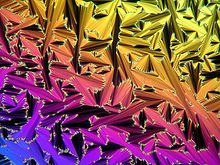
Germany has been the home of many famous inventors and engineers, such as Johannes Gutenberg, who is credited with the invention of movable type printing in Europe; Hans Geiger, the creator of the Geiger counter; and Konrad Zuse, who built the first fully automatic digital computer. German inventors, engineers and industrialists such as Count Ferdinand von Zeppelin, Otto Lilienthal, Gottlieb Daimler, Rudolf Diesel, Hugo Junkers and Karl Benz helped shape modern automotive and air transportation technology.
Aerospace engineer Wernher von Braun developed the first space rocket and later on was a prominent member of NASA and developed the Saturn V Moon rocket, which paved the way for the success of the US Apollo program. Heinrich Rudolf Hertz's work in the domain of electromagnetic radiation was pivotal to the development of modern telecommunication.
With regard to triade patents Germany is in third place after the USA and Japan. With more than 26,500 registrations for patents submitted to the European Patent Office, Germany is the leading European nation. Siemens, Bosch and BASF, with almost 5,000 registrations for patents between them in 2008, are among the Top 5 of more than 35,000 companies registering patents. Together with the USA and Japan, with regard to patents for nano, bio and new technologies Germany is one of the world’s most active nations. With around one third of triade patents Germany leads the way worldwide in the field of vehicle emission reduction.
Science
Main article: Science and technology in Germany
Germany's achievements in sciences have been significant and research and development efforts form an integral part of the country's economy. Germany has been the home of some of the most prominent researchers in various scientific fields.
The Nobel Prize has been awarded to 103 German laureates. The work of Albert Einstein and Max Planck was crucial to the foundation of modern physics, which Werner Heisenberg and Max Born developed further. They were preceded by physicists such as Hermann von Helmholtz, Joseph von Fraunhofer, and Gabriel Daniel Fahrenheit. Wilhelm Conrad Röntgen discovered X-rays, which are called Röntgenstrahlen (Röntgen-rays) in German and many other languages. This accomplishment made him the first winner of the Nobel Prize in Physics in 1901. Numerous significant mathematicians were born in Germany, including Carl Friedrich Gauss, David Hilbert, Bernhard Riemann, Gottfried Leibniz, Karl Weierstrass and Hermann Weyl.
Important research institutions in Germany are the Max Planck Society, the Helmholtz-Gemeinschaft and the Fraunhofer Society. They are independently or externally connected to the university system and contribute to a considerable extent to the scientific output. The prestigious Gottfried Wilhelm Leibniz Prize is granted to ten scientists and academics every year. With a maximum of €2.5 million per award it is one of highest endowed research prizes in the world.
Culture
Main article: Culture of Germany
Germany is historically called Das Land der Dichter und Denker (the land of poets and thinkers). German culture began long before the rise of Germany as a nation-state and spanned the entire German-speaking world. From its roots, culture in Germany has been shaped by major intellectual and popular currents in Europe, both religious and secular. As a result, it is difficult to identify a specific German tradition separated from the larger framework of European high culture. Another consequence of these circumstances is the fact that some historical figures, such as Wolfgang Amadeus Mozart, Franz Kafka and Paul Celan, though not citizens of Germany in the modern sense, must be considered in the context of the German cultural sphere in order to understand their historical situation, work and social relations.
In Germany, the Federal States are in charge of the cultural institutions. There are 240 subsidised theatres, hundreds of symphonic orchestras, thousands of museums and over 25,000 libraries spread over the 16 states. These cultural opportunities are enjoyed by many millions: there are over 91 million German museum visits every year; annually, 20 million go to theatres and operas; while 3.6 million listen to the great symphonic orchestras.

Germany claims some of the world's most renowned classical music composers, including Ludwig van Beethoven, Johann Sebastian Bach, Johannes Brahms and Richard Wagner. As of 2006, Germany is the fifth largest music market in the world and has influenced pop and rock music through artists such as Kraftwerk, Scorpions and Rammstein.
Numerous German painters have enjoyed international prestige through their work in diverse artistic styles. Hans Holbein the Younger, Matthias Grünewald, and Albrecht Dürer were important artists of the Renaissance, Caspar David Friedrich of Romanticism, and Max Ernst of Surrealism. Architectural contributions from Germany include the Carolingian and Ottonian styles, which were important precursors of Romanesque. The region later became the site of significant works in styles such as Gothic, Renaissance and Baroque. Germany was particularly important in the early modern movement, especially through the Bauhaus movement founded by Walter Gropius. Ludwig Mies van der Rohe, also from Germany, became one of the world's most renowned architects in the second half of the 20th century. The glass façade skyscraper was his idea.
Literature
Main article: German literatureGerman literature can be traced back to the Middle Ages and the works of writers such as Walther von der Vogelweide and Wolfram von Eschenbach. Various German authors and poets have won great renown, including Johann Wolfgang von Goethe and Friedrich Schiller. The collections of folk tales published by the Brothers Grimm popularised German folklore on an international level. Influential authors of the 20th century include Thomas Mann, Bertolt Brecht, Hermann Hesse, Heinrich Böll, and Günter Grass.
| Johann Wolfgang von Goethe (1749 – 1832) |
Friedrich Schiller (1759 – 1805) |
Brothers Grimm (1785 – 1863) |
Thomas Mann (1875 – 1955) |
Hermann Hesse (1877 – 1962) |
|---|---|---|---|---|
 |
 |
 |
 |

|
Philosophy
Main article: German philosophy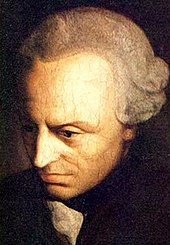
Germany's influence on philosophy is historically significant and many notable German philosophers have helped shape Western philosophy since the Middle Ages. The rise of the modern natural sciences and the related decline of religion raised a series of questions, which recur throughout German philosophy, concerning the relationships between knowledge and faith, reason and emotion, and scientific, ethical, and artistic ways of seeing the world.
Gottfried Leibniz's contributions to rationalism; the establishment of classical German idealism by Immanuel Kant, Johann Gottlieb Fichte, Georg Wilhelm Friedrich Hegel and Friedrich Wilhelm Joseph Schelling; Arthur Schopenhauer's composition of metaphysical pessimism; Karl Marx's and Friedrich Engels' formulation of communist theory; Friedrich Nietzsche's development of perspectivism; Gottlob Frege's contributions to the dawn of analytic philosophy and Martin Heidegger's works on Being have been influential.
Since the 1960s the Frankfurt School has been guided by Jürgen Habermas' work on communicative reason, linguistic intersubjectivity and what Habermas calls "the philosophical discourse of modernity". In the 21st century it has been an important country for the development of contemporary analytic philosophy in continental Europe, along with France, Austria, Switzerland and the Scandinavian countries.
Media

Germany's television market is the largest in Europe, with some 34 million TV households. The many regional and national public broadcasters are organised in line with the federal political structure. Around 90% of German households have cable or satellite TV, and viewers can choose from a variety of free-to-view public and commercial channels. Pay-TV services have not become popular or successful while public TV broadcasters ZDF and ARD offer a range of digital-only channels.
Germany is home to some of the world's largest media conglomerates, including Bertelsmann, the Axel Springer AG and ProSiebenSat.1 Media.
The German book market produces around 60,000 new publications every year. It represents 18% of all the books published worldwide and puts Germany in third place among the world’s book producers. The Frankfurt Book Fair is considered to be the most important book fair in the world for international deals and trading and has a tradition that spans over 500 years.
The country's news is provided for English speakers e.g. by news magazine Der Spiegel and state broadcaster Deutsche Welle.
Cinema
Main article: Cinema of GermanyGerman cinema dates back to the very early years of the medium with the work of Max Skladanowsky. It was particularly influential during the years of the Weimar Republic with German expressionists such as Robert Wiene and Friedrich Wilhelm Murnau. Austrian-based director Fritz Lang, who became a German citizen in 1926 and whose career flourished in the pre-war German film industry, is said to have been a major influence on Hollywood cinema. His silent movie Metropolis (1927) is referred to as the birth of modern Science Fiction movies.
In 1930 Austrian-American Josef von Sternberg directed The Blue Angel, which was the first major German sound film and it brought world fame to actress Marlene Dietrich. Impressionist documentary Berlin: Symphony of a Great City, directed by Walter Ruttmann, is a prominent example of the city symphony genre. The Nazi era produced mostly propaganda films although the work of Leni Riefenstahl still introduced new aesthetics to film.

During the 1970s and 80s, New German Cinema directors such as Volker Schlöndorff, Werner Herzog, Wim Wenders, and Rainer Werner Fassbinder put West German cinema back on the international stage with their often provocative films. More recently, films such as Good Bye Lenin! (2003), Gegen die Wand (Head-on) (2004), Der Untergang (Downfall) (2004), and Der Baader Meinhof Komplex (2008) have enjoyed international success.
The Academy Award for Best Foreign Language Film went to the German production Die Blechtrommel (The Tin Drum) in 1979, to Nowhere in Africa in 2002, and to Das Leben der Anderen (The Lives of Others) in 2007. Among the most famous German actors are Marlene Dietrich, Klaus Kinski, Hanna Schygulla, Armin Mueller-Stahl, Jürgen Prochnow, and Thomas Kretschmann.
The Berlin Film Festival, held annually since 1951, is one of the world's foremost film festivals. An international jury places emphasis on representing films from all over the world and awards the winners with the Golden and Silver Bears. The annual European Film Awards ceremony is held every second year in the city of Berlin, where the European Film Academy (EFA) is located. The Babelsberg Studios in Potsdam are the oldest large-scale film studios in the world and a centre for international film production.
Sports
Main article: Sport in Germany
Sport forms an integral part of German life. Twenty-seven million Germans are members of a sports club and an additional twelve million pursue such an activity individually. Association football is the most popular sport. With more than 6.3 million official members, the German Football Association (Deutscher Fußball-Bund) is the largest sports organisation of its kind worldwide. The Bundesliga attracts the second highest average attendance of any professional sports league in the world. The German national football team won the FIFA World Cup in 1954, 1974 and 1990 and the UEFA European Football Championship in 1972, 1980 and 1996. Germany has hosted the FIFA World Cup in 1974 and 2006 and the UEFA European Football Championship in 1988. Among the most successful and renowned footballers are Franz Beckenbauer, Gerd Müller, Jürgen Klinsmann, Lothar Matthäus, and Oliver Kahn. Other popular spectator sports include handball, volleyball, basketball, ice hockey, and tennis.
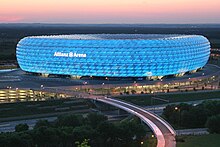
Germany is one of the leading motorsports countries in the world. Race-winning cars, teams and drivers have come from Germany. The most successful Formula One driver in history, Michael Schumacher, has set many significant motorsport records during his career, having won more Formula One World Drivers' Championships and more Formula One races than any other driver since Formula One's debut season in 1950. He is one of the highest paid sportsmen in history and became a billionaire athlete. Constructors like BMW and Mercedes are among the leading manufacturers in motorsport. Additionally, Porsche has won the 24 Hours of Le Mans, a prestigious annual endurance race held in France, 16 times, and Audi has won it 9 times. The Deutsche Tourenwagen Masters is a popular series in Germany.
Historically, German sportsmen have been some of the most successful contenders in the Olympic Games, ranking third in an all-time Olympic Games medal count, combining East and West German medals. In the 2008 Summer Olympics, Germany finished fifth in the medal count, while in the 2006 Winter Olympics they finished first. Germany has hosted the Summer Olympic Games twice, in Berlin in 1936 and in Munich in 1972. The Winter Olympic Games took place in Germany once in 1936 when they were staged in the Bavarian twin towns of Garmisch and Partenkirchen.
Cuisine
Main article: German cuisine
German cuisine varies from region to region. The southern regions of Bavaria and Swabia, for instance, share a culinary culture with Switzerland and Austria. Pork, beef, and poultry are the main varieties of meat consumed in Germany, with pork being the most popular. Throughout all regions, meat is often eaten in sausage form. More than 1500 different types of sausage are produced in Germany. Organic food has gained a market share of around 3.0%, and is predicted to increase further.
A popular German saying has the meaning: "Breakfast like an emperor, lunch like a king, and dine like a beggar." Breakfast is usually a selection of breads and rolls with jam and honey or cold meats and cheese, sometimes accompanied by a boiled egg. Cereals or muesli with milk or yoghurt is less common but widespread. More than 300 types of bread are sold in bakery shops across the country.
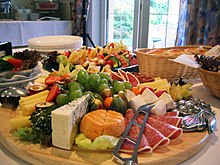
As a country with many immigrants, Germany has adopted many international dishes into its cuisine and daily eating habits. Italian dishes like Pizza and Pasta, Turkish and Arab dishes like Döner Kebab and Falafel are well established, especially in bigger cities. International burger chains, as well as Chinese and Greek restaurants, are widespread. Indian, Thai, Japanese, and other Asian cuisines have gained popularity in recent decades. Among high-profile restaurants in Germany, the Michelin guide has awarded nine restaurants three stars, the highest designation, while 15 more received two stars. German restaurants have become the world's second most decorated eateries after France.
Although wine is becoming more popular in many parts of Germany, the national alcoholic drink is beer. German beer consumption per person is declining but—at 116 litres annually—it is still among the highest in the world. Beer varieties include Alt, Bock, Dunkel, Kölsch, Lager, Malzbier, Pils, and Weizenbier. Among 18 surveyed western countries, Germany ranked 14th in the list of per capita consumption of soft drinks in general, while it ranked third in the consumption of fruit juices. Furthermore, carbonated mineral water and Schorle (its mixture with fruit juice) are very popular in Germany.
Society

Since the 2006 World Cup celebrations the internal and external perception of Germany's national image has changed. In annually conducted global surveys known as Nation Brands Index, Germany became significantly and repeatedly higher ranked after the tournament. People in 20 different states were asked to assess the country's reputation in terms of culture, politics, exports, its people and its attractiveness to tourists, immigrants and investments. Germany has been named the world's most valued nation among 50 countries in 2008. Another global opinion poll based on 29,977 responses in 28 countries for the BBC revealed that Germany is recognised for the most positive influence in the world in 2010, leading 28 investigated countries. A majority of 59% have a positive view of the country, while 14% have a negative view.

Germany is a legally and socially tolerant country towards homosexuals. Civil unions have been permitted since 2001. Gays and lesbians can legally adopt their partner's biological children (stepchild adoption). The Foreign Minister Guido Westerwelle and the mayor of Berlin, Klaus Wowereit, are openly gay.
During the last decade of the 20th century Germany has transformed its attitude towards immigrants considerably. Until the mid-nineties the opinion was widespread that Germany is not a country of immigration, even though about 10% of the population were of non-German origin. After the end of the influx of so-called Gastarbeiter (blue-collar guest-workers), refugees were a tolerated exception to this point of view. Many guest workers were of Turkish origins and brought an interesting influence into the country. Today the government and much of German society are acknowledging the opinion that controlled immigration should be allowed based on the qualification of immigrants.
With an expenditure of €67 billion on international travel in 2008, Germans spent more money on travel than any other country. The most visited foreign destinations were Spain, Italy and Austria.
International rankings
| Organization | Survey | Ranking |
|---|---|---|
| Institute for Economics and Peace | Global Peace Index | 16 out of 144 |
| United Nations Development Programme | Human Development Index | 22 out of 182 |
| Transparency International | Corruption Perceptions Index | 14 out of 180 |
| World Economic Forum | Global Competitiveness Report | 7 out of 133 |
| Freedomhouse Organization | Freedom of the Press Evaluation, 2010 | 19 out of 192 |
See also
References
- Notes
- In Germany, other languages have been officially recognised as legitimate autochthonous (regional) languages by the ECRML. In each of these, Germany's official name is as follows:
- Template:Lang-da;
- Template:Lang-nds;
- Template:Lang-hsb;
- Template:Lang-dsb;
- Template:Lang-rom;
- Saterland Frisian: Bundesrepublek Dütschland
- References
- ^ CIA. "CIA Factbook". Retrieved 2009-08-02.
- ^ "First demographic estimates for 2009" (PDF). Eurostat. Retrieved 2010-01-31.
- ^ "Germany". International Monetary Fund. Retrieved 2010-04-21.
- Human Development Report 2009. The United Nations. Retrieved 5 October 2009.
- Max Mangold (ed.), ed. (1995). Duden, Aussprachewörterbuch (Duden Pronunciation Dictionary) (in German) (6th ed.). Mannheim: Dudenverlag Bibliographisches Institut & F.A. Brockhaus AG. pp. 271, 53f. ISBN 3-411-04066-1.
{{cite book}}:|editor=has generic name (help) - "Germany: Inflow of foreign population by country of nationality, 1994 to 2003". Migrationinformation.org. Retrieved 2010-01-04.
- Susan Taylor Martin (28 December 1998). "On Jan. 1, out of many arises one Euro". St. Petersburg Times. St. Petersburg, Fla.: National,1.A.
- ^ Edmund L. Andrews (1 January 2002). "Germans Say Goodbye to the Mark, a Symbol of Strength and Unity". New York Times. Retrieved 2010-04-26.
- David Smith (15 June 2001). "Euro notes and coins to flood continent". New Strait Times. Retrieved 2010-04-26.
- Germany world's second biggest aid donor after US TopNews, India. Retrieved 2008-04-10.
- "The fifteen major spenders in 2006". Recent trends in military expenditure. Stockholm International Peace Research Institute. 2007. Archived from the original (PDF) on 2007-08-14. Retrieved 2007-08-23.
- The leader of Europe? Answers an ocean apart International Herald Tribune. April 4, 2008. Retrieved 2008-04-04.
- Confidently into the Future with Reliable Technology www.innovations-report.de. May 7, 2008. Retrieved 2008-04-04.
- Schulze, Hagen (1998). Germany: A New History. Cambridge, MA: Harvard University Press. p. 4.
{{cite book}}: Check|first=value (help) - "German", The Concise Oxford Dictionary of English Etymology. Ed. T. F. Hoad. Oxford: Oxford University Press, 1996. Oxford Reference Online. Oxford University Press. Retrieved March 4, 2008.
- Jill N. Claster: Medieval Experience: 300–1400. New York University Press 1982, p. 35. ISBN 0-8147-1381-5.
- The Cambridge Ancient History, vol. 12, p. 442. ISBN 0-521-30199-8.
- The Great Famine (1315–1317) and the Black Death (1346–1351). Lynn Harry Nelson. The University of Kansas.
- The Thirty-Years-War, Gerhard Rempel, Western New England College.
- "The savage wars of peace: England, Japan and the Malthusian trap". Alan Macfarlane (1997). p.51. ISBN 0-631-18117-2
- Fulbrook, Mary: A Concise History of Germany, Cambridge University Press 1991, p. 97. ISBN 0-521-54071-2
- Martin, Norman. German Confederation 1815–1866 (Germany) Flags of the World. October 5, 2000. Retrieved 2006-12-07.
- Last German World War I Veteran Believed to Have Died. Spiegel Online. January 22, 2008.
- Stephen J. Lee: Europe, 1890–1945. Routledge 2003, p. 131. ISBN 0-415-25455-8.
- Deutsches Historisches Museum. "Das Ermächtigungsgesetz 1933" (in German). Deutsches Historisches Museum. Retrieved 2008-09-12.
An der Abstimmung nicht teilnehmen konnten die 81 Abgeordneten der Kommunistischen Partei Deutschlands (KPD). Ihre Mandate waren auf Basis der Reichstagsbrandverordnung bereits am 8. März 1933 annulliert worden.
Roderick Stackelberg, Hitler's Germany: origins, interpretations, legacies. Routledge 1999, p. 103. ISBN 0-415-20114-4.
Scheck, Raffael. Establishing a Dictatorship: The Stabilization of Nazi Power Colby College. Retrieved 2006-07-12. - Deutsches Historisches Museum. "Industrie und Wirtschaft" (in German). Deutsches Historisches Museum. Retrieved 2008-09-12.
Der Vierjahresplan sollte ab 1936 die wirtschaftliche Kriegsfähigkeit Deutschlands herbeiführen. . . .Bereits im Februar 1933 erklärte Hitler, dass alle öffentlichen Maßnahmen zur Arbeitsbeschaffung zugleich der "Wehrhaftmachung" zu dienen hätten und den Interessen des Staates untergeordnet seien. . . .
{{cite web}}: Cite has empty unknown parameters:|month=and|coauthors=(help) - Steinberg, Heinz Günter. Die Bevölkerungsentwicklung in Deutschland im Zweiten Weltkrieg : mit einem Überblick über die Entwicklung von 1945 bis 1990. Bonn 1991.
- Niewyk, Donald L. and Nicosia, Francis R. The Columbia Guide to the Holocaust, Columbia University Press, 2000, pp. 45-52.
- "Leaders mourn Soviet wartime dead". BBC News. May 9, 2005.
- "Nuremberg: Nazis On Trial". Professor Richard Overy. BBC - History.
- Beevor, Antony (2003) . Berlin: The downfall 1945. Penguin Books. pp. 409–412. ISBN 0-140-28696-9.
Altogether at least 2 million German women are thought to have been raped . . .
Beevor, Antony (2003) . Berlin: The downfall 1945. Penguin Books. pp. 31–32. ISBN 0-140-28696-9.He went on to boast that '2 million of our children were born in Germany.'
- Wise, Michael Z. (1998). "Bonn, Capital of Self-Effacement". Capital dilemma: Germany's search for a new architecture of democracy. Princeton Architectural Press, 1998. p. 23. ISBN 9781568981345.
- Colchester, Nico. D-mark day dawns Financial Times. January 1, 2001. Retrieved 2006-12-07.
- Template:De icon Landtag einstimmig gegen Komplettumzug WDR; 14 September 2006.
- Template:De icon Deutschlands heimliche Hauptstadt Landtag einstimmig gegen Komplettumzug WDR; 20 June 2006.
- Dempsey, Judy. Germany is planning a Bosnia withdrawal International Herald Tribune. October 31, 2006. Retrieved 2006-11-30.
- Climate In Germany GermanCulture. Retrieved 2010-26-08.
- List of Ecoregions: Terrestrial Ecoregions WWF. Retrieved 21 November 2000.
- List of famous Zoological gardens in European countries www.eupedia.com. Retrieved 2008-10-17.
- Some interesting zoo facts www.americanzoos.info/. Retrieved 2008-10-17.
- Template:De iconTierstatistik 2008, Zoo Berlin. Retrieved 19 November 2009.
- Starting points and focus of environmental communication, German Federal Environmental Foundation, 16 October 2004.
- PIPA (2007-09-24). "All Countries Need to Take Major Steps on Climate Change: Global Poll" (PDF). BBC World service Poll, carried out by Globescan. Program on International Policy Attitudes at the University of Maryland, College Park. Retrieved 2008-02-11.
Eighty-seven percent of German respondents agree that human activity is a significant cause of climate change and 95 percent think it is necessary to take measures to deal with the problem.
- Reinforcing Germany's environmental protection industry Umweltbundesamt. Retrieved 2007-11-25.
- Germany greenest country in the world Times of India. Retrieved 2008-11-25.
- "Article 79 of the Grundgesetz". Bundesministerium der Justiz (in German). www.gesetze-im-internet.de. Retrieved 2008-12-07.
- Christian Democratic Union/Christian Social Union U.S. Library of Congress. Retrieved 2006-12-07.
- Federal Constitutional Court, Bundesverfassungsgericht.de. Retrieved April 13, 2007.
- Template:De icon § 2 Strafvollzugsgesetz Bundesministerium der Justiz. Retrieved 19 November 2009.
- Declaration by the Franco-German Defence and Security Council Elysee.fr May 13, 3004. Retrieved 2006-12-03.
- Glaab, Manuela. German Foreign Policy: Book Review Internationale Politik. Spring 2003. Retrieved 2007-01-03.
- Harrison, Hope. Template:PDFlink German historical institute, Washington, DC, Bulletin supplement 1, 2004, American détente and German ostpolitik, 1969–1972".
- Germany's New Face Abroad Deutsche Welle. October 14, 2005. Retrieved 2006-12-03.
- Background Note: Germany U.S. Department of State. July 6, 2006. Retrieved 2006-12-03.
- Ready for a Bush hug?, The Economist, July 6, 2006. Retrieved 2006-12-31.
- ^ Template:PDFlink U.S. Embassy in Berlin. May 2006. Retrieved 2006-12-03.
- German Still Most Frequently Reported Ancestry U.S. Census Bureau June 30, 2004. Retrieved 2006-12-03.
- Kaiserslautern, Germany Overview U.S. Military. Retrieved 2006-12-03.
- Aims of German development policy Federal Ministry for Economic Cooperation and Development April 10, 2008. Retrieved 2008-12-07.
- Table: Net Official Development Assistance 2009 OECD
- Template:De icon Grundgesetz für die Bundesrepublik Deutschland: Article 115a Bundestag.de. Retrieved 19 November 2009. Archived 2008-06-14 at the Wayback Machine
- "Einsatzzahlen – Die Stärke der deutschen Einsatzkontingente" (in German). Bundeswehr. Retrieved 2009-11-08.
- Destatis. "Durchschnittliche Kinderzahl 2008 in den neuen Ländern angestiegen" (in German). Retrieved 2010-01-31.
- Destatis. "Im Jahr 2060 wird jeder Siebente 80 Jahre oder älter sein" (in German). Retrieved 2010-01-31.
- "Demographic Transition Model". Barcelona Field Studies Centre. 27 September 2009. Retrieved 23 May 2010.
- http://www.tagesschau.de/inla/meldung34348.html
- "20% of Germans have immigrant roots". Burlington, Vermont: Burlington Free Press. 15 July 2010. pp. 4A.
- "Bevölkerung nach Migrationshintergrund" (in German). German Federal Statistical Office. Retrieved 2010-03-26.
- State of World Population 2006 United Nations Population Fund. 2006. Retrieved 2007-01-01.
- "Focus-Migration: Germany".
- "U.S. Census Bureau, 2005 American Community Survey". Retrieved 2007-04-15.
{{cite web}}: Unknown parameter|coauthors=ignored (|author=suggested) (help) The 1990 census gives 57.9 million, or 23.3% of the U.S. population. - Template:Pt icon A Imigração Alemã no Brasil Deutsche Welle. Retrieved 19 November 2009.
- 2001 Canadian Census gives 2,742,765 total respondents stating their ethnic origin as partly German, with 705,600 stating "single-ancestry".
- "Fewer Ethnic Germans Immigrating to Ancestral Homeland". Migration Information Source. February 2004
- http://www.destatis.de
- ^ European Commission (2006). "Special Eurobarometer 243: Europeans and their Languages (Survey)" (PDF). Europa (web portal). Retrieved 2007-02-03.
European Commission (2006). "Special Eurobarometer 243: Europeans and their Languages (Executive Summary)" (PDF). Europa (web portal). Retrieved 2007-02-03. - European Commission (2004). "Many tongues, one family. Languages in the European Union" (PDF). Europa (web portal). Retrieved 2007-02-03.
- National Geographic Collegiate Atlas of the World. Willard, Ohio: R.R Donnelley & Sons Company. 2006. pp. 257–270. ISBN Regular:0-7922-3662-9, 978-0-7922-3662-7. Deluxe:0-7922-7976-X, 978-0-7922-7976-1.
{{cite book}}: Check|isbn=value: invalid character (help); Unknown parameter|month=ignored (help) - ^ Template:De icon "EKD-Statistik: Christen in Deutschland 2007". Evangelische Kirche in Deutschland. Retrieved 2010-02-13.
- Religionen in Deutschland: Mitgliederzahlen(German), Religionswissenschaftlicher Medien- und Informationsdienst, Retrieved 2009, May 05-30.
- Germany Has 1 Million More Muslims than Previously Thought. Spiegel Online. June 24, 2009.
- http://www.adherents.com/adhloc/Wh_112.html
- Template:De icon Religionen in Deutschland: Mitgliederzahlen Religionswissenschaftlicher Medien- und Informationsdienst; 31 October 2009. Retrieved 19 November 2009.
- Germany Euro-Islam.info. Retrieved 2006-11-30.
- Blake, Mariah. In Nazi cradle, Germany marks Jewish renaissance Christian Science Monitor. November 10, 2006. Retrieved 2006-11-30.
- The Jewish Community of Germany European Jewish Congress. Retrieved 2006-11-30.
- Template:De icon Die Zeit 12/07, page 13
- "Eurobarometer on Social Values, Science and technology 2005 (page 11)" (PDF). Retrieved 2007-05-05.
- ^ Template:PDFlink U.S. Library of Congress. December 2005. Retrieved 2006-12-04.
- In PISA 2000, Germany was the country with the highest correlation between test score and social background index. In the following test periods, this result could not be replicated.
- "Top 100 World Universities". ARWU. Archived from the original on 2008-08-22. Retrieved 2009-03-14.
- Tuition Fees in Germany German Academic Exchange Service. Retrieved 2006-11-30.
- Norris, Floyd (2010-02-20). "A Shift in the Export Powerhouses". The New York Times. Retrieved 2010-03-31.
- "CPI 2009 table". Transparency International. Retrieved 2009-11-18.
- The Innovation Imperative in Manufacturing: How the United States Can Restore Its Edge
- Rank Order – GDP (purchasing power parity) CIA Factbook 2005. Retrieved 31 December 2006.
- , suite101.com, 1 April 2010. Retrieved 25 August 2010.
- Wind Power Federal Ministry of Economics and Technology (Germany) Retrieved 30 November 2006.
- Berg, S., Winter, S., Wassermann, A. The Price of a Failed Reunification Spiegel Online International. 5 September 2005. Retrieved 28 November 2006.
- Kulish, Nicholas (2009-06-19). "In East Germany, a Decline as Stark as a Wall". The New York Times. Retrieved 2010-03-31.
- Hopkins, Kathryn (14 November 2008). "Germany officially in recession as OECD expects US to lead recovery". London: The Guardian. Retrieved 2010-03-31.
- "Germany agrees on 50-billion-euro stimulus plan". France 24. 6 January 2009.
- The 100 Top Brands 2006, Businessweek. Retrieved 26 November 2007.
- , CNN Money. Retrieved 7 August 2010.
- "Autobahn-Temporegelung" (PDF) (in German). ADAC. October 2007. Retrieved 2008-11-15.
- Template:De icon Geschäftsbericht 2006 der Deutschen Bahn AG, Deutsche Bahn. Retrieved 19 November 2009.
- German lessons, The Economist. Retrieved 2008-11-29.
- Germany split over green energy, BBC. Retrieved 13 April 2007.
- Research in Germany German Embassy, New Delhi. Retrieved 2010-28-08.
- Horst, Zuse. The Life and Work of Konrad Zuse Everyday Practical Electronics (EPE) Online. Retrieved 2007-01-02. Archived 2007-02-20 at the Wayback Machine
- "Automobile". Microsoft Encarta Online Encyclopedia 2006. Archived from the original on 2008-04-20. Retrieved 2007-01-02.
- The Zeppelin U.S. Centennial of Flight Commission. Retrieved 2007-01-02.
- Historical figures in telecommunications. International Telecommunication Union. January 14, 2004. Retrieved 2007-01-02.
- Industry strongly engaged in research Facts about Germany. Retrieved 2010-29-08.
- Back to the Future: Germany – A Country of Research German Academic Exchange Service (2005-02-23). Retrieved 2006-12-08.
- Nobel Prize, Nobelprize.org. Retrieved 19 November 2009.
- Roberts, J. M. The New Penguin History of the World, Penguin History, 2002. Pg. 1014. ISBN 0-14-100723-0.
- The Alfred B. Nobel Prize Winners, 1901–2003 History Channel from The World Almanac and Book of Facts 2006. Retrieved 2007-01-02.
- Gottfried Wilhelm Leibniz Prize, DFG. Retrieved March 12, 2007.
- Wasser, Jeremy. Spätzle Westerns Spiegel Online International. April 6, 2006. Retrieved 2006-12-06.
- "Federal Republic of Germany: Culture". Encarta Online Encyclopedia 2006. Archived from the original on 2008-03-28. Retrieved 2007-01-02.
- Unbelievable Multitude www.study-in-germany.de Retrieved 2008-10-17.
- Music market worth US$ 32 billion P2pnet.net April 7, 2004. Retrieved 2006-12-07.
- 2006 A Dictionary of Architecture and Landscape Architecture (Paperback) , Second (in English) , Oxford University Press, 880. ISBN 0-19-860678-8
- Kjell Espmark (1999-12-03). "The Nobel Prize in Literature". Nobelprize.org. Retrieved 2006-08-14.
- Habermas, Jürgen. (1987). The Theory of Communicative Action. Third Edition, Vols. 1 & 2, Beacon Press.
- Habermas, Jürgen. (1990). Moral Consciousness and Communicative Action, MIT Press.
- Habermas, Jürgen. (1987). The Philosophical Discourse of Modernity. MIT Press.
- Searle, John. (1987). The Blackwell Companion to Philosophy, "Introduction". Wiley-Blackwell.
- Country profile: Germany, BBC News. Retrieved 2007-12-07.
- Bordwell, David (2003) . "The Introduction of Sound". Film History: An Introduction (2nd ed.). New York City: McGraw-Hill. p. 204. ISBN 978-0071151412.
{{cite book}}: Cite has empty unknown parameter:|origdate=(help); Unknown parameter|coauthors=ignored (|author=suggested) (help) - Leni Riefenstahl, Filmbug Movie Stars. Retrieved April 13, 2007.
- Rainer Werner Fassbinder, Fassbinder Foundation. Retrieved April 13, 2007.
- Awards:Das Leben der Anderen, IMDb. Retrieved April 13, 2007.
- 2006 FIAPF accredited Festivals Directory, International Federation of Film Producers Associations, retrieved on December 11, 2006.
- ^ "Germany Info: Culture & Life: Sports". Germany Embassy in Washington, D.C. Retrieved 28 December 2006.
- Ornstein, David (2006-10-23). "What we will miss about Michael Schumacher". London: Guardian Unlimited. Retrieved 19 October 2007.
- "Beijing 2008 Medal Table". The Official Website of the Beijing 2008 Olympic Games. Retrieved 8 September 2008.
- "Turin 2006 Medal Table". International Olympic Committee. Retrieved 28 December 2006.
- "German food stats". www.nationmaster.com. Retrieved 26 November 2007.
- "Organic Agriculture in Germany". organic-Europe. Retrieved 26 November 2007.
- Eating the German way, Cultural Profiles Project. Retrieved 2007, November 26.
- 300 Types of Bread, www.germany-tourism.de. Retrieved 2007, November 26.
- Schnitzel Outcooks Spaghetti in Michelin Guide, Deutsche Welle. Retrieved 2007, November 26.
- German cuisine beats Italy, Spain in gourmet stars, Reuters India. Retrieved 2007, November 26.
- Europe's largest beer market, royalunibrew.com. Retrieved 2007, November 26.
- Soft drink consumption, www.nationmaster.com. Retrieved 2007, November 26.
- How Germany won the World Cup of Nation Branding BrandOvation. Retrieved 2007-11-25.
- "GfK Roper Public Affairs & Media and Simon Anholt Release Global Reputation Study Ranking 50 Countries: Germany on Top, U.S. Seventh in Nation Brands IndexSM" (Press release). GfK. 2008-09-24. Retrieved 2009-02-08.
- World warming to US under Obama, BBC poll suggests BBC NEWS. Retrieved 2010-04-19.
- BBC World Service Poll, PDF, BBC NEWS. Retrieved 2010-04-19.
- Germany extends gay rights News24.com. Retrieved 2007-11-25.
- Weinthal, Benjamin (2006-08-31). "He's Gay, and That's Okay". Gay City News. Retrieved 2009-09-03.
- From ethnic nation to universalistic immigrant integration: Germany The Integration of Immigrants in European Societies. Retrieved 2008-11-25.
- Germans spend most on foreign trips: Industry group The Economic Times. Retrieved 2009-03-15.
- "Vision of Humanity". Vision of Humanity. Retrieved 2010-02-04.
- "Freedom of the Press 2010" (PDF). freedomhouse.org. Retrieved 3 May 2010.
{{cite web}}: Italic or bold markup not allowed in:|publisher=(help)
External links
Listen to this article(3 parts, 1 hour and 24 minutes)
- Deutschland.de – Official Germany portal (non-profit)
- Official site of German Chancellor (German and English)
- Deutsche Welle – Germany's international broadcaster
- Chief of State and Cabinet Members
- "Germany". The World Factbook (2025 ed.). Central Intelligence Agency.
- Germany entry at Encyclopædia Britannica
- Germany at UCB Libraries GovPubs
- Template:Dmoz
- Facts about Germany – by the German Federal Foreign Office
- Destatis.de – Federal Statistical Office Germany Template:En icon
Template:Link GA
Template:Link GA
Template:Link GA
Template:Link GA
Template:Link GA
Template:Link GA
Template:Link FA Template:Link FA Template:Link FA Template:Link FA Template:Link FA Template:Link FA Template:Link FA Template:Link FA Template:Link FA Template:Link FA
Categories:- Ill-formatted IPAc-en transclusions
- Germany
- European countries
- European Union member states
- Alpine countries
- Countries bordering the Atlantic Ocean
- Countries bordering the Baltic Sea
- Republics
- Federal countries
- German-speaking countries
- G8 nations
- G20 nations
- Liberal democracies
- Western Europe
- Member states of the Union for the Mediterranean
- States and territories established in 1871
- Members of the North Atlantic Treaty Organization
